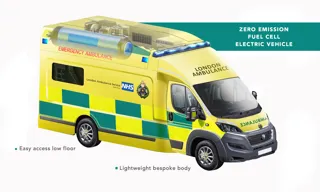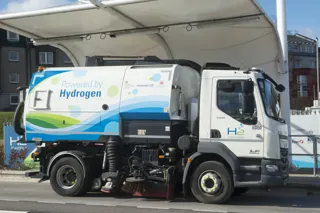ULEMCo is expanding its hydrogen fuel conversion capability to include airport ground support vehicles, in partnership with with Teesside International Airport, RAF Leeming, and Newcastle University.
Project ZeHyDA (Zero emission Hydrogen Demonstration for Airport applications) will convert a base aircraft tow tug vehicle to an electric hybrid running with a 100% hydrogen zero emission combustion engine.
This is the company’s first mobile application of the zero-emission hydrogen engine technology that it announced in 2019, when it was tested for static generators. The project will enable the engine to work with an electric drivetrain system, and to be demonstrated as part of the Tees Valley Hydrogen Transport Hub in ground support vehicles, alongside work to assess the wider opportunity for use of hydrogen at airports and in the region.
In parallel with the conversion activity, ULEMCo will perform laboratory testing of a large engine conversion that will be suitable for the 7.5-tonne ground support trucks that also work at airports. This will be part of a demonstration of the flexibility of hydrogen combustion technologies, and their ability to decarbonise a wide range of heavy-duty vehicle applications cost effectively.
The tests, being assessed with the collaboration of Newcastle University, will show that an engine of this size can be configured to meet the real-world duty cycle requirements of the application, at the same time as delivering no harmful air quality emissions.
“We are delighted to be able to build on the success of our 100% hydrogen static genset engine with this mobile vehicle”, said Amanda Lyne, managing director of ULEMCo. “Airport ground support vehicles are yet another niche application that can benefit from decarbonisation using hydrogen, without the delay of building a nationwide hydrogen infrastructure.”
Tees Valley Mayor Ben Houchen added: “Converting our ground support vehicles to hydrogen will help boost our clean energy credentials as part of the UK’s first Hydrogen Transport Hub, maintain our local air quality and drive the UK’s net zero ambitions.”























Login to comment
Comments
No comments have been made yet.